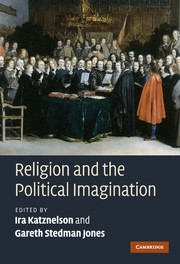Book contents
- Frontmatter
- Contents
- List of contributors
- Acknowledgements
- Introduction: multiple secularities
- 1 Secularisation: religion and the roots of innovation in the political sphere
- 2 Regarding toleration and liberalism: considerations from the Anglo-Jewish experience
- 3 The Enlightenment, the late eighteenth-century revolutions and their aftermath: the ‘secularising’ implications of Protestantism?
- 4 In the lands of the Ottomans: religion and politics
- 5 The Russian Orthodox Church and secularisation
- 6 The American experience of secularisation
- 7 French Catholic political thought from the deconfessionalisation of the state to the recognition of religious freedom
- 8 Religion and the origins of socialism
- 9 From 1848 to Christian Democracy
- 10 The disciplining of the religious conscience in nineteenth-century British politics
- 11 Colonial secularism and Islamism in North India: a relationship of creativity
- 12 The 1960s
- 13 Gendering secularisation: locating women in the transformation of British Christianity in the 1960s
- 14 Does constitutionalisation lead to secularisation?
- 15 Europe's uneasy marriage of secularism and Christianity since 1945 and the challenge of contemporary religious pluralism
- 16 On thick and thin religion: some critical reflections on secularisation theory
- Index
8 - Religion and the origins of socialism
Published online by Cambridge University Press: 05 June 2012
- Frontmatter
- Contents
- List of contributors
- Acknowledgements
- Introduction: multiple secularities
- 1 Secularisation: religion and the roots of innovation in the political sphere
- 2 Regarding toleration and liberalism: considerations from the Anglo-Jewish experience
- 3 The Enlightenment, the late eighteenth-century revolutions and their aftermath: the ‘secularising’ implications of Protestantism?
- 4 In the lands of the Ottomans: religion and politics
- 5 The Russian Orthodox Church and secularisation
- 6 The American experience of secularisation
- 7 French Catholic political thought from the deconfessionalisation of the state to the recognition of religious freedom
- 8 Religion and the origins of socialism
- 9 From 1848 to Christian Democracy
- 10 The disciplining of the religious conscience in nineteenth-century British politics
- 11 Colonial secularism and Islamism in North India: a relationship of creativity
- 12 The 1960s
- 13 Gendering secularisation: locating women in the transformation of British Christianity in the 1960s
- 14 Does constitutionalisation lead to secularisation?
- 15 Europe's uneasy marriage of secularism and Christianity since 1945 and the challenge of contemporary religious pluralism
- 16 On thick and thin religion: some critical reflections on secularisation theory
- Index
Summary
Socialism has rarely if ever been treated as part of the religious history of Europe and the wider world. Through most of the twentieth century, political and intellectual historians, particularly those writing about the modern period, tended to leave the study of religion to sociologists and psychologists. In the face of philosophical criticism, scientific advance and large-scale social change, religious mentalities and beliefs, it was assumed, were receding. Socialism, it was thought, belonged to that cluster of modern ideas which took the place of religious conceptions of the world. It was considered a ‘social’ movement and essentially secular, the expression of an urban and industrial working class and the growth of class-consciousness.
But in 1979, the world changed. With the unanticipated triumph of the Iranian Revolution, and the resurgence of religious fundamentalism in different parts of the world, conflicts between temporal and spiritual authority once again came to fore. These developments in turn have provided a different and arguably more appropriate framework, within which to examine the history of socialism. For socialism was above all a product of the fundamental crisis of spiritual authority created by the French Revolution. It was the outcome of a critique, not so much of the state, but of the church, and of the unsuccessful revolutionary attempts to find a replacement for it.
- Type
- Chapter
- Information
- Religion and the Political Imagination , pp. 171 - 189Publisher: Cambridge University PressPrint publication year: 2010
- 23
- Cited by

